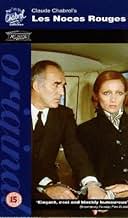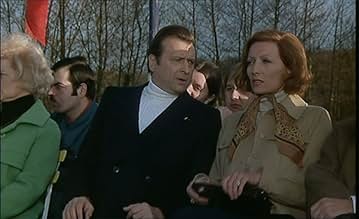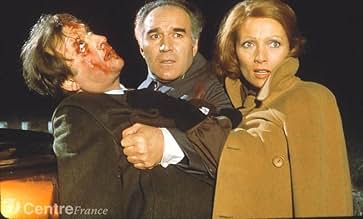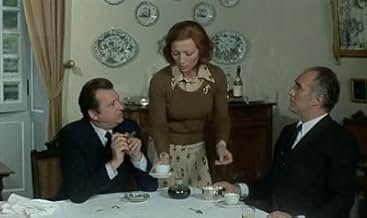CALIFICACIÓN DE IMDb
6.9/10
2.2 k
TU CALIFICACIÓN
Agrega una trama en tu idiomaIn a small French town, the mayor discovers his wife is cheating on him, a betrayal that eventually leads to murder.In a small French town, the mayor discovers his wife is cheating on him, a betrayal that eventually leads to murder.In a small French town, the mayor discovers his wife is cheating on him, a betrayal that eventually leads to murder.
- Dirección
- Guionistas
- Elenco
- Premios
- 1 premio ganado y 1 nominación en total
- Dirección
- Guionistas
- Todo el elenco y el equipo
- Producción, taquilla y más en IMDbPro
Opiniones destacadas
In a small town in France, the mayor Paul Delamare (Claude Piéplu) invites the leftist Pierre Maury (Michel Piccoli) to be his deputy mayor in his reelection. Paul is married to Lucienne Delamare (Stéphane Audran) and stepfather of Lucienne's teenage daughter Hélène Chevalier (Eliana De Santis), but sexually neglects Lucienne. Pierre is married to the weak, sick and bitter Clotilde Maury (Clotilde Joano). Soon Pierre and Lucienne have a torrid lover affair during Paul's frequent travels to Paris. When Clotilde dies, the doctor believes it was a suicide, and the case is closed by the police. Paul proposes a dirty real estate business to Pierre to lure the inhabitants of the town and make lots of money, but Pierre is reluctant to accept the proposal. Pierre discloses to Lucienne that he killed Clotilde that was very ill, and they should take care with their encounters to avoid gossips and suspicion from the locals. When Pierre travels to Paris, Lucienne spends the night with Pierre, and when she returns home at 4:00 AM, Pierre surprises her since he has not traveled. He calls Pierre and uses his affair to force Pierre to accept the dirty deal. Now Paul will travel to Paris, and Lucienne asks him to go with him. While Lucienne is driving in the lonely road, she stops the car on the shoulder and Pierre kills Paul and burns the car to the ashes simulating an accident. The police clear Lucienne and close the case as car accident, but Pierre advises her not to see each other for a long period. Everything is perfect for the two lovers until something unexpected happens.
"Les noces rouges", a.k.a "Wedding in Blood" (1973), is a suspenseful romance by Claude Chaborl, with naive plot point and conclusion. The plot is excellent until the moment that Hélène writes a letter to the chief of police. Maybe such naivety could be acceptable in 1973, in the countryside of France. However, on the present days, it would be ridiculous. But the politician Pierre confessing his murders, including his wife's one, and without a lawyer is not acceptable. Romantically it might work but is not credible. My vote is seven.
Title (Brazil): "Amantes Inseparáveis" ("Inseparable Lovers")
"Les noces rouges", a.k.a "Wedding in Blood" (1973), is a suspenseful romance by Claude Chaborl, with naive plot point and conclusion. The plot is excellent until the moment that Hélène writes a letter to the chief of police. Maybe such naivety could be acceptable in 1973, in the countryside of France. However, on the present days, it would be ridiculous. But the politician Pierre confessing his murders, including his wife's one, and without a lawyer is not acceptable. Romantically it might work but is not credible. My vote is seven.
Title (Brazil): "Amantes Inseparáveis" ("Inseparable Lovers")
Behind every film there lies a story which is certainly true of this one as Michel Piccoli as Pierre and Stéphane Audran as Lucienne are based upon Bernard and Yvette, the 'diabolical lovers' of Bourganeuf. Indeed the film's release had to be postponed so as not to coincide with the murder trial.
Although lacking the stylistic brilliance of some of Chabrol's other works in this genre, it's construction, precision and refinement are those of a director eminently secure in his material.
Here Valencay stands in for Bourganeuf and becomes an unflattering portrait of provincial France. Its mean-spirited and hypocritical denizens thrive on prurient gossip which motivates Pierre and Lucienne, aware of their bourgeois social status, to become secret murderers rather than public adulterers.
What is most striking about the film is the gradual darkening of tone, not least when Claude Piéplu as the pompous husband ceases to be a figure of fun and shows his true colours and whose brutal demise is brilliantly realised. The downbeat ending with the final shot of the couple's shackled hands is most effective whilst Pierre Jansen's score is well integrated.
The opening quotation from the third part of the 'Oresteia' of Aeschylus leads us to believe that the film will deal with moral complexity but in reality one can feel no sympathy at all for Pierre and Lucienne for had they not been so obsessed with appearances they could have simply left their troublesome partners rather than bumping them off. The overriding emotion, for this viewer at any rate, is one of pity, for like so many literary/cinematic couples who have done away with inconvenient spouses, the initial feeling of 'freedom' is an illusion as they have merely swapped one kind of entrapment for another.
Although lacking the stylistic brilliance of some of Chabrol's other works in this genre, it's construction, precision and refinement are those of a director eminently secure in his material.
Here Valencay stands in for Bourganeuf and becomes an unflattering portrait of provincial France. Its mean-spirited and hypocritical denizens thrive on prurient gossip which motivates Pierre and Lucienne, aware of their bourgeois social status, to become secret murderers rather than public adulterers.
What is most striking about the film is the gradual darkening of tone, not least when Claude Piéplu as the pompous husband ceases to be a figure of fun and shows his true colours and whose brutal demise is brilliantly realised. The downbeat ending with the final shot of the couple's shackled hands is most effective whilst Pierre Jansen's score is well integrated.
The opening quotation from the third part of the 'Oresteia' of Aeschylus leads us to believe that the film will deal with moral complexity but in reality one can feel no sympathy at all for Pierre and Lucienne for had they not been so obsessed with appearances they could have simply left their troublesome partners rather than bumping them off. The overriding emotion, for this viewer at any rate, is one of pity, for like so many literary/cinematic couples who have done away with inconvenient spouses, the initial feeling of 'freedom' is an illusion as they have merely swapped one kind of entrapment for another.
Claude Chabrol started as part of the nouvelle vague,as contemporary of Truffaut and -yuk!- Godard ,but his roots are in the old cinema,that of Clouzot and Duvivier.That's why his best movies hold up very well today.
A first golden era included such works as "à double tour" "le beau Serge" and "les cousins".Then came a period of barren inspiration which ended with "les biches" (1967) with which Chabrol entered his most fruitful period the 1967-1973 era:at least five of the works of this time are first-rate works :"la femme infidel" (1968;dubious American remake);"the beast must die" (1969) ;"the butcher" (1969) his towering achievement;"la rupture"(1970) his most underrated ;"juste avant la nuit" (1971) and finally "les noces rouges" which seems today as the last hurrah,a farewell to a golden era.
Unlike the four other films I mention "les noces rouges" is based on a true story which was widely talked about in France of the early seventies.But ,true or not,Chabrol's touch is strong and he makes the story a chabrolesque plot to the core.The bourgeois whom Chabrol depicted in "la femme infidel" or "la rupture" ,and who was played by Michel Bouquet has turned into a caricature.Enter Claude Piéplu,and with his high-pitched voice,he almost overshadows the excellent Stephane Audran and Michel Piccoli.An impotent self-satisfied mean bourgeois with political ambitions ,he accepts his wife's(Audran) affair with his deputy mayor(Piccoli) ,more,it's fine with him because it will be useful for his shady business.The scene when he tells the lovers so is incredible;lines such as "I want everybody to be happy around me!" he delivers to a stunned Piccoli and a bewildered Audran give goose pimples.
You will notice the omnipresence of water:in "que la Bete meure" and "le boucher" ,it symbolized a return from hell,not necessarily a happy end but a world with some peace of mind.In "les noces rouges" it appears during the love scenes (played by the two actors with more gusto than usual :never in a Chabrol movie the carnal act had been -and will be-so much to the fore)as a symbol of innocence (after all, the two people have no sex with their legal partners)in the sin.But it's the heroine's daughter ,called Helene ,who epitomizes innocence and some kind of deus ex machina.
What's more puzzling is that Stephane Audran's characters were all called Hélène in the four other movies I mention:in "la femme infidel' Helene had a lover but with some excuse :her husband appeared like a washout sexually;in "le boucher" she was a brave schoolteacher ,purity flesh on the bone;in "la rupture" her character had to fight against a hostile bourgeois world .In "les noces rouges" Audran ,called Lucienne,is on the other side of the mirror:she really becomes a criminal,almost in a dream .When her daughter,Hélène,who took the place she occupied in former movies asks her "I want you to be happy,mom,please tell me the truth" Audran does not seem to realize all that means.And when she does,it will be too late.
Les noces rouges" is also a movie which depicts political life circa 1970 in a small town where gossips run rampant.And as usual,Chabrol is marvelous when it comes to painting vignettes of ordinary life -see the scene in the library-
It would take Chabrol five years to muster this sort of command ("Violette Nozieres" (1978)),and although he has occasionally made great works ("l'enfer" " la cérémonie" ),he will be remembered in fifty years or so for those gems of the late sixties/early seventies era."Les noces rouges" is a must.
A first golden era included such works as "à double tour" "le beau Serge" and "les cousins".Then came a period of barren inspiration which ended with "les biches" (1967) with which Chabrol entered his most fruitful period the 1967-1973 era:at least five of the works of this time are first-rate works :"la femme infidel" (1968;dubious American remake);"the beast must die" (1969) ;"the butcher" (1969) his towering achievement;"la rupture"(1970) his most underrated ;"juste avant la nuit" (1971) and finally "les noces rouges" which seems today as the last hurrah,a farewell to a golden era.
Unlike the four other films I mention "les noces rouges" is based on a true story which was widely talked about in France of the early seventies.But ,true or not,Chabrol's touch is strong and he makes the story a chabrolesque plot to the core.The bourgeois whom Chabrol depicted in "la femme infidel" or "la rupture" ,and who was played by Michel Bouquet has turned into a caricature.Enter Claude Piéplu,and with his high-pitched voice,he almost overshadows the excellent Stephane Audran and Michel Piccoli.An impotent self-satisfied mean bourgeois with political ambitions ,he accepts his wife's(Audran) affair with his deputy mayor(Piccoli) ,more,it's fine with him because it will be useful for his shady business.The scene when he tells the lovers so is incredible;lines such as "I want everybody to be happy around me!" he delivers to a stunned Piccoli and a bewildered Audran give goose pimples.
You will notice the omnipresence of water:in "que la Bete meure" and "le boucher" ,it symbolized a return from hell,not necessarily a happy end but a world with some peace of mind.In "les noces rouges" it appears during the love scenes (played by the two actors with more gusto than usual :never in a Chabrol movie the carnal act had been -and will be-so much to the fore)as a symbol of innocence (after all, the two people have no sex with their legal partners)in the sin.But it's the heroine's daughter ,called Helene ,who epitomizes innocence and some kind of deus ex machina.
What's more puzzling is that Stephane Audran's characters were all called Hélène in the four other movies I mention:in "la femme infidel' Helene had a lover but with some excuse :her husband appeared like a washout sexually;in "le boucher" she was a brave schoolteacher ,purity flesh on the bone;in "la rupture" her character had to fight against a hostile bourgeois world .In "les noces rouges" Audran ,called Lucienne,is on the other side of the mirror:she really becomes a criminal,almost in a dream .When her daughter,Hélène,who took the place she occupied in former movies asks her "I want you to be happy,mom,please tell me the truth" Audran does not seem to realize all that means.And when she does,it will be too late.
Les noces rouges" is also a movie which depicts political life circa 1970 in a small town where gossips run rampant.And as usual,Chabrol is marvelous when it comes to painting vignettes of ordinary life -see the scene in the library-
It would take Chabrol five years to muster this sort of command ("Violette Nozieres" (1978)),and although he has occasionally made great works ("l'enfer" " la cérémonie" ),he will be remembered in fifty years or so for those gems of the late sixties/early seventies era."Les noces rouges" is a must.
I believe this film is based on a real double murder by Bernard Coustie in 1970, and follows that closely until the final scenes. I was shocked by the Benny Hill quality of the love scenes which undermines the early scenes. The acting as a whole has a semi-comic feel and the film is short and feels perfunctory - if it wasn't Chabrol would we even remember it?
However, the score is terrific, and as a time-capsule of small town France it is entertaining.
This film has a persistently artificial feel to it that at times serves it well and at times is a hindrance - it sometimes serves to highlight the hypocrisy and corruption of the milieu and give the central characters a decadent air, but at times it interferes with character development, as it interferes with our understanding of the characters. The plot itself is rather conventional but is essentially an excuse to dissect a certain milieu. The most interesting character is in my opinion very underrated: the mayor's stepdaughter, who is clearly intelligent, somewhat sombre but decidedly not bookish. She is the sole character that does not seem motivated by purely selfish, fairly conventional motives (money, political ambition, boredom, sexual desire, etc), making her motivations harder to fathom. She is the only character with any real mystery about her; it's hinted she has some kind of fascination with death, and she makes a surprising comment related to the role of women, all of which add to her ambiguity as a character.
¿Sabías que…?
- ConexionesFeatured in La ceremonia (1995)
Selecciones populares
Inicia sesión para calificar y agrega a la lista de videos para obtener recomendaciones personalizadas
- How long is Wedding in Blood?Con tecnología de Alexa
Detalles
- Fecha de lanzamiento
- Países de origen
- Idioma
- También se conoce como
- Wedding in Blood
- Locaciones de filmación
- Valençay, Indre, Francia(main location: street scenes, cemetery, Maury's apartment 31 Rue de la République)
- Productoras
- Ver más créditos de la compañía en IMDbPro
- Tiempo de ejecución1 hora 35 minutos
- Mezcla de sonido
- Relación de aspecto
- 1.66 : 1
Contribuir a esta página
Sugiere una edición o agrega el contenido que falta













